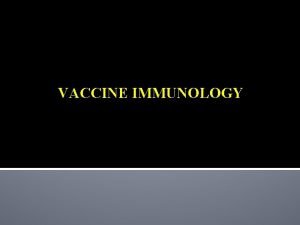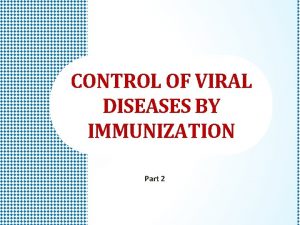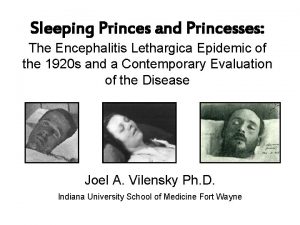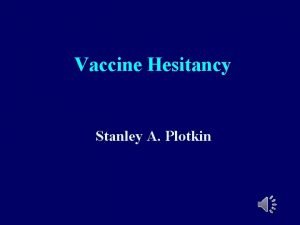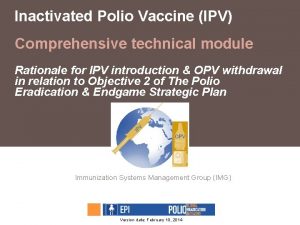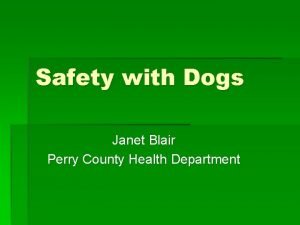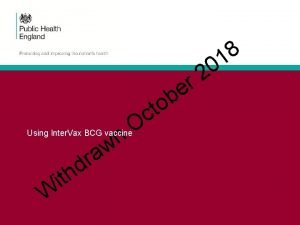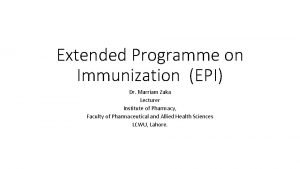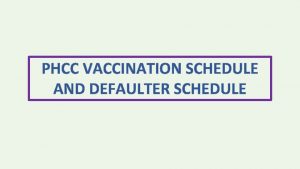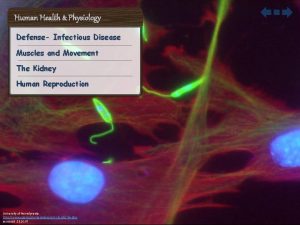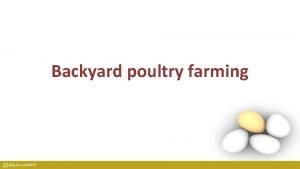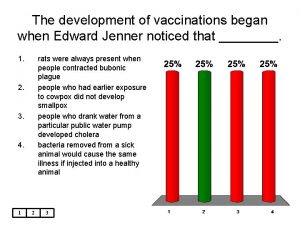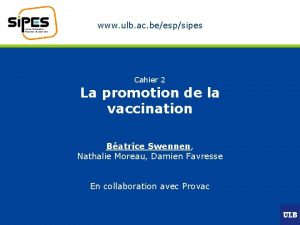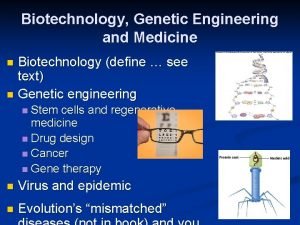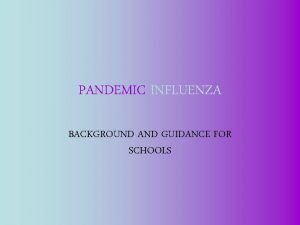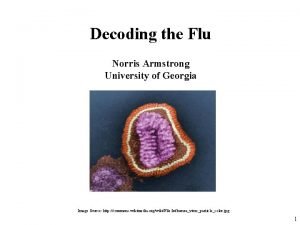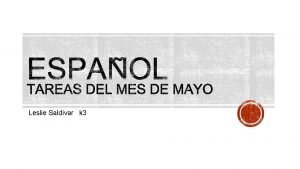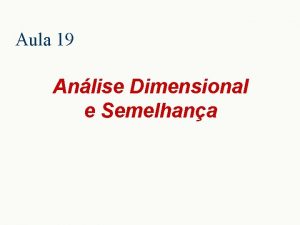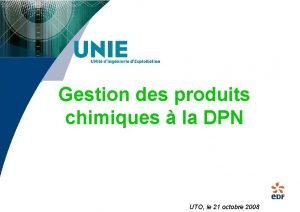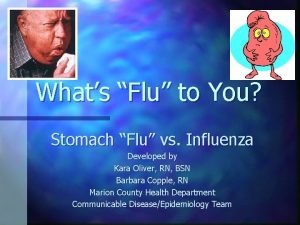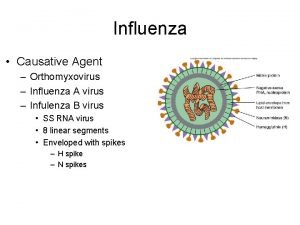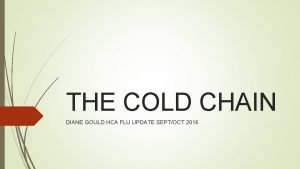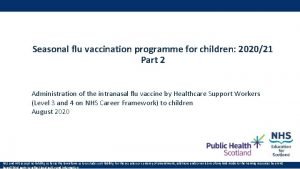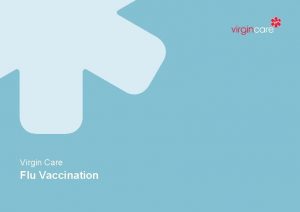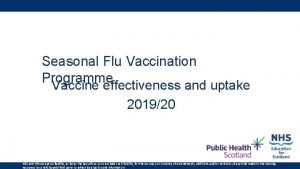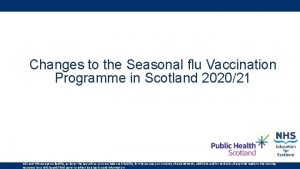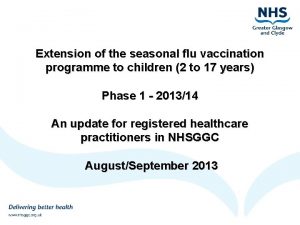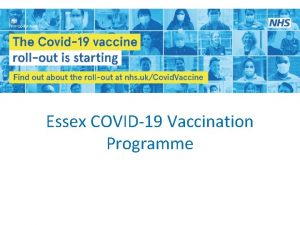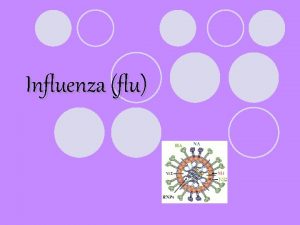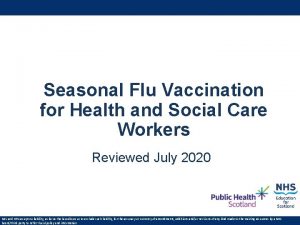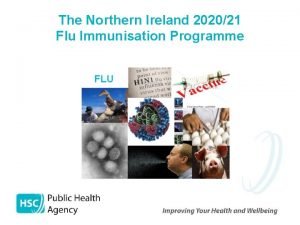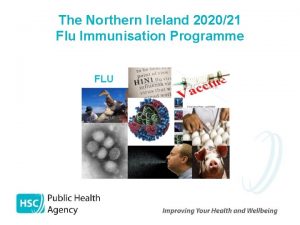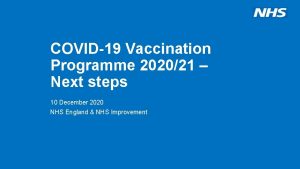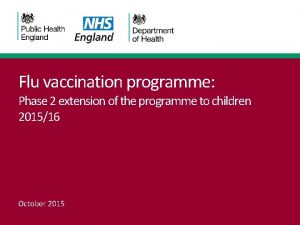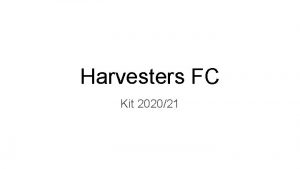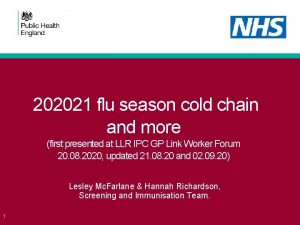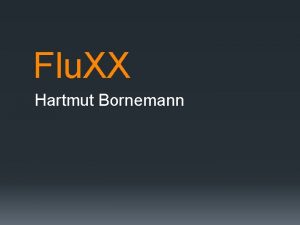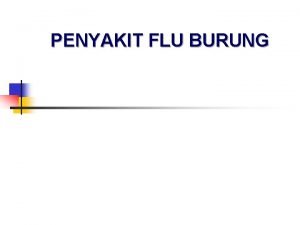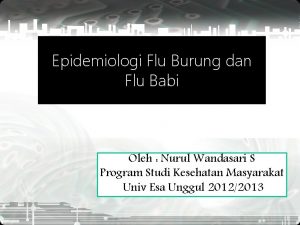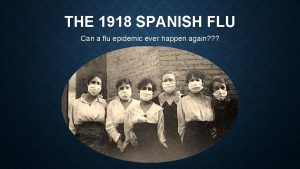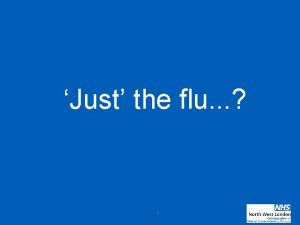Seasonal flu vaccination programme for adults 202021 Part


























- Slides: 26

Seasonal flu vaccination programme for adults: 2020/21 Part 1 Administration of the Seasonal Flu vaccine by Healthcare Support Workers (Level 3 and 4 on NHS Career Framework) to adults August 2020 NES and HPS accept no liability, as far as the law allows us to exclude such liability, for the accuracy or currency of amendments, additions and/or revisions of any kind made to the training resources by a NHS board/third party to reflect local policy and information

Structure of this resource This resource is presented in three parts: • Part 1 - Theoretical knowledge base of flu and flu vaccines • Part 2 - The storage, handling and administration of the flu vaccine for adults • Part 3 - The legal aspects of immunisation and current issues This resource is accompanied by a booklet to support competence in the administration of the flu vaccine which can be used by NHS boards to record progress towards, and the achievement of competence in this skill. NES and HPS accept no liability, as far as the law allows us to exclude such liability, for the accuracy or currency of amendments, additions and/or revisions of any kind made to the training resources by a NHS board/third party to reflect local policy and information

Aim of resource The aim of this Education and Training Resource is to equip Healthcare Support Workers at Level 3 and 4 on the NHS Career Framework with the knowledge and skills to support safe and effective administration of the flu vaccine to adults. NES and HPS accept no liability, as far as the law allows us to exclude such liability, for the accuracy or currency of amendments, additions and/or revisions of any kind made to the training resources by a NHS board/third party to reflect local policy and information

Learning outcomes On completion of this three part education and training resource Healthcare Support Workers at Level 3 and 4 on the NHS Career Framework will be able to: • • Describe the effects of flu and explain the benefits of the seasonal flu immunisation programme Discuss their role and limitations in the delivery of the seasonal flu immunisation programme and follow the correct procedures for the storage, handling and administration of vaccines Explore current issues surrounding immunisation practice Practice in line with the Code of Conduct for Healthcare Support Workers (Scottish Government 2009) NES and HPS accept no liability, as far as the law allows us to exclude such liability, for the accuracy or currency of amendments, additions and/or revisions of any kind made to the training resources by a NHS board/third party to reflect local policy and information

Contents Part 1 • Overview of the current seasonal flu vaccination programme in Scotland • What is flu? Part 2 • Inactivated flu vaccines • Use of Inactivated Flu Vaccine • Storage and handling of flu vaccines Part 3 • Legislation governing the administration of vaccines • Anaphylaxis, basic life support and adverse reactions • Documentation, record keeping and reporting NES and HPS accept no liability, as far as the law allows us to exclude such liability, for the accuracy or currency of amendments, additions and/or revisions of any kind made to the training resources by a NHS board/third party to reflect local policy and information

Part 1 NES and HPS accept no liability, as far as the law allows us to exclude such liability, for the accuracy or currency of amendments, additions and/or revisions of any kind made to the training resources by a NHS board/third party to reflect local policy and information

Learning Outcomes: On completion of Part 1 HCSWs will be able to: • Describe the current seasonal flu vaccination programme in Scotland • Describe the main features of flu • Outline the complications of flu • Explain the benefits of the flu vaccine NES and HPS accept no liability, as far as the law allows us to exclude such liability, for the accuracy or currency of amendments, additions and/or revisions of any kind made to the training resources by a NHS board/third party to reflect local policy and information

Overview of current seasonal flu vaccination programme in Scotland NES and HPS accept no liability, as far as the law allows us to exclude such liability, for the accuracy or currency of amendments, additions and/or revisions of any kind made to the training resources by a NHS board/third party to reflect local policy and information

Seasonal Flu Vaccination • In Scotland there is an annual vaccination programme which aims to reduce the impact (morbidity and mortality) of flu particularly in high risk groups • The vaccine is modified each season to ensure the best protection for risk groups • The vaccine is offered from September to March in any flu season NES and HPS accept no liability, as far as the law allows us to exclude such liability, for the accuracy or currency of amendments, additions and/or revisions of any kind made to the training resources by a NHS board/third party to reflect local policy and information

COVID-19 Pandemic • Given the impact of COVID-19 on the most vulnerable in society, it is imperative that we do all that we can to reduce the risk of our vulnerable population from contracting seasonal flu • It is therefore essential that we actively encourage and support the population to receive the seasonal flu immunisation this winter • Delivery of the seasonal flu programme will protect those at risk, prevent ill health and minimise further impact on the health and social care sector NES and HPS accept no liability, as far as the law allows us to exclude such liability, for the accuracy or currency of amendments, additions and/or revisions of any kind made to the training resources by a NHS board/third party to reflect local policy and information

Seasonal Flu Vaccination Programme 2020/21 Adults; changes to programme • Extension of the national programme to offer vaccination to the those who live with individuals falling within the COVID-19 shielding group, social care staff who deliver direct personal care and all those aged 55 -64 years old • Some changes to the influenza vaccines that JCVI has advised for use in the differing patient groups in 2020/21 • A wide range of vaccines are available for the 2020/21 flu season NES and HPS accept no liability, as far as the law allows us to exclude such liability, for the accuracy or currency of amendments, additions and/or revisions of any kind made to the training resources by a NHS board/third party to reflect local policy and information

Eligibility of Adult Seasonal Flu Programme Scotland 202021 • Individuals aged 65 years and over • Individuals aged 18 -64 years in clinical risk groups including pregnant women • Households of those who fall within the COVID-19 shielding group • Healthcare workers • Social care workers • All those aged 55 -64 years not otherwise eligible • Those aged 50 -54 years not otherwise eligible* NES and HPS accept no liability, as far as the law allows us to exclude such liability, for the accuracy or currency of amendments, additions and/or revisions of any kind made to the training resources by a NHS board/third party to reflect local policy and information

Phased Approach • All those eligible should be given flu vaccination as soon as possible so that individuals are protected when flu begins to circulate • For previously eligible cohorts, social care workers who deliver direct patient care, and household members of those shielding, this will mean starting when the vaccine becomes available in September/October • For those aged 55 -64, not otherwise eligible this will mean starting in December, at the latest • This phased approach is aligned to the availability of vaccines, and prioritisation of the cohorts who are most at risk from the seasonal flu NES and HPS accept no liability, as far as the law allows us to exclude such liability, for the accuracy or currency of amendments, additions and/or revisions of any kind made to the training resources by a NHS board/third party to reflect local policy and information

Seasonal Flu Vaccination Programme 2020/21 Clinical Risk Groups • There are no changes to the clinical risk groups • Uptake targets for both the 65 years and over group, and the under 65’s “at-risk” population will remain 75%, in line with World Health Organisation (WHO) targets • Pregnant women, at any stage of pregnancy, remain eligible for, and are recommended to have, flu vaccination (WHO uptake target remains 75%) • In addition to the clinical risk groups the programme has been extended to offer vaccination to those who live with individuals falling within the Covid-19 shielding group, social care staff who deliver direct personal care and all those aged 55 -64 years old NES and HPS accept no liability, as far as the law allows us to exclude such liability, for the accuracy or currency of amendments, additions and/or revisions of any kind made to the training resources by a NHS board/third party to reflect local policy and information

Seasonal Flu Vaccination Programme 2020/21 Health and Social Care Workers • • Timely immunisation of all health and social care workers in direct contact with patients/clients will be a critical component in our efforts to protect the most vulnerable in our society High rates of staff vaccination will help to protect individual staff members but also reduce the risks of transmission of the flu virus within health and social care premises which will contribute to the protection of individuals who may have suboptimal response to their own immunisations Furthermore, it will help to maintain the workforce and minimise disruption to services that provide patient/client care by aiming to reduce staff sickness absence. This is targeted at those working in frontline social care settings no matter of whether they are employed by the NHS, Local Authorities, private or third sector employers or whether they are sub-contracted NES and HPS accept no liability, as far as the law allows us to exclude such liability, for the accuracy or currency of amendments, additions and/or revisions of any kind made to the training resources by a NHS board/third party to reflect local policy and information

Seasonal Flu Vaccination Programme 2020/21 Healthcare Support Workers should ensure they are familiar with the Green Book Chapter 19 and always refer any concerns to a Registered Healthcare Practitioner NES and HPS accept no liability, as far as the law allows us to exclude such liability, for the accuracy or currency of amendments, additions and/or revisions of any kind made to the training resources by a NHS board/third party to reflect local policy and information

What is Flu? NES and HPS accept no liability, as far as the law allows us to exclude such liability, for the accuracy or currency of amendments, additions and/or revisions of any kind made to the training resources by a NHS board/third party to reflect local policy and information

Influenza viruses There are 3 types of influenza viruses: NES and HPS accept no liability, as far as the law allows us to exclude such liability, for the accuracy or currency of amendments, additions and/or revisions of any kind made to the training resources by a NHS board/third party to reflect local policy and information

Influenza A virus • • The virus contains genetic material at its centre There are 2 proteins on the surface of the virus called H and N There are different types of H and N referred to by numbers The role of the H protein is to help the virus attach to the cells in the body • The role of the N protein is to help release the virus into the body NES and HPS accept no liability, as far as the law allows us to exclude such liability, for the accuracy or currency of amendments, additions and/or revisions of any kind made to the training resources by a NHS board/third party to reflect local policy and information

Influenza A virus –genetic change Influenza viruses change in two different ways: • • • ‘Drift’ – when tiny changes take place in the H and N proteins- this happens constantly ‘Shift’ – this is a much more major change Genetic change happens when one individual is infected with two different strains of the influenza A virus at the same time The genetic material from each mixes up and then re-combines resulting in a completely new strain Few people have immunity so this may lead to widespread epidemics or even a pandemic NES and HPS accept no liability, as far as the law allows us to exclude such liability, for the accuracy or currency of amendments, additions and/or revisions of any kind made to the training resources by a NHS board/third party to reflect local policy and information

Features of flu • • • Transmitted by large droplets, small-particle aerosols and by hand to mouth/eye contamination from an infected surface Incubation period 1 -5 days (average 2 -3 days) though may be longer especially in children and people with reduced immunity Acute viral infection of respiratory tract Common symptoms include: • • • Sudden onset of fever, chills, headache, myalgia and severe fatigue Dry cough, sore throat and stuffy nose In young children gastrointestinal symptoms such as vomiting and diarrhoea may be frequently seen NES and HPS accept no liability, as far as the law allows us to exclude such liability, for the accuracy or currency of amendments, additions and/or revisions of any kind made to the training resources by a NHS board/third party to reflect local policy and information

Possible complications of flu Common: • Bronchitis • Otitis media (children), sinusitis Less common: • Secondary bacterial pneumonia • Meningitis, encephalitis • Primary influenza pneumonia • Most serious illness in neonates, pregnant women, older people and those with underlying disease NES and HPS accept no liability, as far as the law allows us to exclude such liability, for the accuracy or currency of amendments, additions and/or revisions of any kind made to the training resources by a NHS board/third party to reflect local policy and information

The immune response to vaccine • When a vaccine is administered, the body responds by producing antibodies • These antibodies will protect a person in the future who is exposed to that particular infection NES and HPS accept no liability, as far as the law allows us to exclude such liability, for the accuracy or currency of amendments, additions and/or revisions of any kind made to the training resources by a NHS board/third party to reflect local policy and information

Seasonal flu vaccine uptake in Scotland 2015 -16 2016 -17 2017 -18 2018 -19 2019 -20 65 years and older 74. 5% 72. 8% 73. 7% 74. 0% Under 65 yrs- At risk (excluding healthy pregnant women and carers) 48. 0% 44. 9% 44. 8% 42. 4% 42. 3% Pregnant women-no risk 49. 9% 49. 3% 48. 1% 44. 5% 42. 9% Aged 2 -5 yrs(not yet in school) 57. 1% 59. 0% 56. 9% 55. 8% 52. 5% Primary School 71. 5% 73. 0% 72. 9% 71. 1% Healthcare workers 33. 2% 35. 3% 45. 7% 51. 2% 53. 8% NES and HPS accept no liability, as far as the law allows us to exclude such liability, for the accuracy or currency of amendments, additions and/or revisions of any kind made to the training resources by a NHS board/third party to reflect local policy and information

Vaccine Confidence • • • In almost every community there may be some individuals who have lower levels of trust and confidence in vaccines or may doubt or be hesitant about vaccination Anti-vaccine messages are not new; however, the means of dissemination may be Very serious events following immunisation are extremely rare and the dangers of vaccine preventable diseases are far greater than the risks associated with vaccines* What healthcare practitioners say and how they interact with patients and caregivers can strongly influence vaccine acceptance Research from Public Health England** shows that healthcare practitioners remain the most trusted source of advice on immunisation HCSWs should ensure that they are confident to have conversations with patients and carers regarding the benefits of the flu vaccine and should refer to the registered practitioner where appropriate NES and HPS accept no liability, as far as the law allows us to exclude such liability, for the accuracy or currency of amendments, additions and/or revisions of any kind made to the training resources by a NHS board/third party to reflect local policy and information

 Meaning of variolation
Meaning of variolation Vaccination schedule in palestine
Vaccination schedule in palestine Japanese encephalitis vaccination sydenham
Japanese encephalitis vaccination sydenham Mandatory vaccination
Mandatory vaccination Pcv vaccine route
Pcv vaccine route Dog vaccination perry county
Dog vaccination perry county Niccolo paganini fingers
Niccolo paganini fingers Vaccination xard
Vaccination xard Epi
Epi 10 rights of medication administration
10 rights of medication administration Bankeryds vårdcentral influensavaccin
Bankeryds vårdcentral influensavaccin Oogenesis defination
Oogenesis defination Poultry vaccination schedule
Poultry vaccination schedule A vaccination for smallpox was developed in 1796 by ____
A vaccination for smallpox was developed in 1796 by ____ Vaccination bruxelles
Vaccination bruxelles Spanish flu
Spanish flu Flu timeline
Flu timeline Decoding the flu case study answers
Decoding the flu case study answers Homophones of ball
Homophones of ball Oraciones con fla fle fli flo flu
Oraciones con fla fle fli flo flu Mec flu
Mec flu Flu produit chimique
Flu produit chimique Stomach flu vs influenza
Stomach flu vs influenza Spanish flu
Spanish flu Causative agent of influenza is
Causative agent of influenza is Flu
Flu Flu watch canada
Flu watch canada
